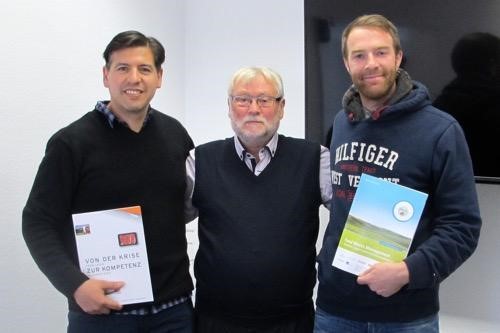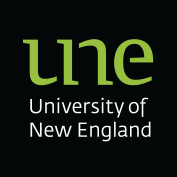From the 1st of January 2016, the shared project “Chain Failure and Chain Goods in Sustainable Food Chains” has been underway with a view to develop a theoretical framework that will enable a closer analysis and improved understanding of value chain outcomes. Concern around issues of transparency and regulation in protection and promotion of competitive food markets has lead the UNE project team to develop a new method of analysing food value chains that is complementary to existing public finance theory.
UNE Business School were pleased to host our research partners from University of Bonn back in September, when they made a visit to Australia as part of the collaboration required of the project.
The team on this project includes Professor Garry Griffith, Emeritus Professor Euan Fleming, Professor Derek Baker, Dr Emilio Morales and Dr Stuart Mounter from University of New England, as well as Professor Gerhard Scheifer, Dr Johannes Simons and Mr Christian Deutsch (PhD candidate) from University of Bonn.
 Dr Emilio Morales recently returned from a visit to Germany for some site visits as well as work to further the research being undertaken for the project. His travels from 4th to 25th November included visits to sites such as Fruitania, a wholesaler of fruits and vegetables that trades high-quality products within Germany and across Europe. Frutania works with producers from cultivation planning to marketing. The company buys products from farmers and deliver them to retailers; an interesting study case for the assessment of the logistics/distribution system, and the value that it represents in terms of business opportunities for farmers producing fruits and vegetables in the local area.
Dr Emilio Morales recently returned from a visit to Germany for some site visits as well as work to further the research being undertaken for the project. His travels from 4th to 25th November included visits to sites such as Fruitania, a wholesaler of fruits and vegetables that trades high-quality products within Germany and across Europe. Frutania works with producers from cultivation planning to marketing. The company buys products from farmers and deliver them to retailers; an interesting study case for the assessment of the logistics/distribution system, and the value that it represents in terms of business opportunities for farmers producing fruits and vegetables in the local area.
Dr Morales also met with Robin Callaghan at Global G.A.P. (Good Agricultural Practices – A Standard of Food Safety and Traceability). This organisation works with retailers to set the certification standards according to their requirements. The main objective is to guarantee to retailers and consumers that the products have been produced in a way that is according to standards. Doing so, Global G.A.P. helps producers to overcome non-tariff barriers present in different countries, demonstrating that the products’ quality meets specified standards; hence, it opens markets for producers when they have their products certified, such as the case of Europe, where it is compulsory to be certified for being able to sell agro-food products.
The visit took Dr Morales to meet with Professor Bernd Hallier, for an expert interview visiting from Rösrath. As presented in Professor Hallier’s website forum: “Within a PPP supported by the German DAAD Academic Exchange Service Prof.Dr. Bernd Hallier discussed the food security structures and developments of the last 30 years with Dr.L. Emilio Morales from the University of New England/Australia and Christian Deutsch from the University of Bonn/Germany”.
Other expert interviews during the trip included Dr Richard Lehmann (GS1) and Dr. Jivka Deiters (Research Group Food Chain Management/Uni of Bonn) during a visit to Germany Knowledge Centre of GS1 – an organisation that aims to reach efficient cross-company processes through value chains. Dr Morales also met with expert of sustainability management, Dr. Detert Brinkmann, to hear about meat value chains in Germany from the meat provider Rasting.
Other site visits included Euro Pool System International (Deutschland) GmbH – a company focused on logistics and tray rentals; a meeting with Dr. Brügger and Robert Künzel from Deutscher Fruchthandelsverband to speak on fruit and vegetable wholesale and Mrs Sabrina Melis on QS – Quality Scheme for food.
A visit to Eurotier Fair in Hanover presented an opportunity to learn more about new technologies being introduced into the industry. Eurotier is the International trade fair of DLG for animal production and management, which was located in Hanover from 15th to 18th November, 2016.
Dr Morales shared some interesting conclusions from his trip, overall an opportunity to exchange expertise and discuss applied cases of Chain Goods and Failures in Australia and Germany. The team are able to move into the new year with a broader understanding of how information can be dispersed in chains through certification and labeling, work to be done in the area of food waste management, and an understanding around how animal welfare concerns have informed to development of incentives, with a view to developing standardised procedures and regulations.
Dr Morales was also happy to meet with a recent UNE PhD graduate, Dr Scott Harrison, who is now working at University of Siegen – read more about his work.
2017 will bring more collaboration and visits between UNE and University of Bonn.




Recent Comments